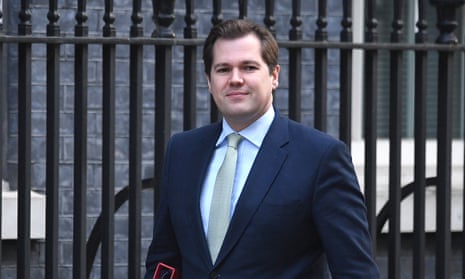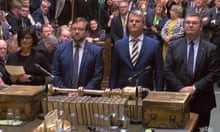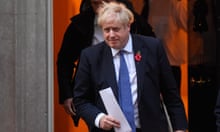The UK housing secretary, Robert Jenrick, has insisted three days is sufficient time for MPs to debate the government’s withdrawal agreement bill – and anyone who votes against it in Tuesday’s crunch debate is trying to thwart Brexit.
The House of Commons will hold two key votes late on Tuesday: one on the second reading of the bill – effectively on the principle of whether it should proceed – and another on the government’s fast-track timetable for pushing it through parliament.
If MPs reject this plan, it will be all but impossible for the prime minister to meet his promise of leaving the EU by 31 October, though he will blame the failure on parliament.
The 110-page bill was published on Monday evening – and the chancellor, Sajid Javid, has said he does not intend to carry out an economic impact of it, because it is “self-evidently” in the UK’s interests to end uncertainty about Brexit.
Asked whether he believed MPs had enough time to scrutinise the legislation, Jenrick said: “I do.”
“The House of Commons has had 500 hours of debates on Brexit. Many of the issues in this bill are very familiar to MPs, they’ve been known for a long time – such as the provisions on EU citizens living within the UK.
“And you have to remember that the purpose of this bill is purely to put into UK law the terms of our exit from the EU: it isn’t to determine our future relationship with the EU. That, we’ve committed, will be subject to future debates and votes in parliament, later on, once we’ve left,” he told BBC Radio 4’s Today programme.
Jacob Rees-Mogg, the leader of the house, announced on Monday that he hoped MPs would have finished with the bill by the end of Thursday so it can proceed to the House of Lords.
The bill reveals that – as promised by Theresa May and confirmed by Johnson – MPs will be given a vote on the negotiating mandate for the UK’s future relationship with the EU, which would be due to take place within 30 days of Britain leaving the bloc.
Jenrick said: “This is a piece of legislation which simply puts into UK law what the PM has managed to negotiate, confounding his critics, with the EU.”
He added: “If MPs disagree with the future relationship then that is a debate for another day – unless they actually just want to frustrate Brexit. And that is the litmus test for the debate that will come today. Those MPs who want to deliver Brexit will vote with the government today.”
However, the legislation also says the negotiating mandate for the future deal must be consistent with the political declaration that forms part of Johnson’s Brexit deal – and which specifies a “free trade agreement” outside the customs union.
It is this looser relationship with the EU – outside the customs union and single market – that makes Johnson’s deal more appealing to the Eurosceptic European Research Group (ERG).
Many of them, including Steve Baker and Mark Francois, have abandoned their erstwhile allies in the Democratic Unionist party to back the prime minister.
As well as defending the government’s timetable, Jenrick dismissed fears that workers’ rights could be reduced, once they are no longer underpinned by EU law.
May’s withdrawal agreement included a legally binding commitment to track EU standards in areas including workers’ rights, as she sought a relationship that would come as close as possible to “frictionless” trade, while ending free movement.
Johnson’s deal transfers those “level playing field” commitments to the non-legally binding political declaration, to form part of the negotiations on the future trade deal.
Quick GuideHow is Boris Johnson's Brexit deal different from Theresa May's?
Show
The new Brexit deal is essentially the old Brexit deal with a new chapter on the protocol on Ireland and Northern Ireland and a few key tweaks to the political declaration. Here is a link to the full text.
The backstop is replaced
The backstop has essentially been replaced by a full stop whereby Northern Ireland remains aligned to the EU from the end of the transition period for at least four years. A change can only happen if it is voted on by the Stormont assembly.
Consent
Stormont will have a key role in future Brexit arrangements. And if there is cross-community support to remain aligned to the EU rather than the UK the consent will hold for eight years.
The arrangements in this deal will automatically kick in for a mandated four years if there is a breakdown in trade talks, so it remains a “backstop” but with a permanent tinge.
That four-year period will start at the end of December 2020.
Two months before the end of the four-year period, that is October 2024, Stormont will be asked to vote on whether to remain aligned to the EU in ways outlined by this deal or not.
Checks on border, ports and airports
Under the deal, the UK and the EU are “underlining their firm commitment to no customs and regulatory checks or controls and related physical infrastructure at the border between Ireland and Northern Ireland”.
Future trade deals
The EU and the UK will aim for a zero-tariff deal with unlimited quotas. The entire UK, including Northern Ireland, will be free to sign trade deals. The line in the political declaration that “the United Kingdom will consider aligning with union rules in relevant areas” in any future trade talks has been ditched.
Customs
Northern Ireland will remain legally in the UK customs territory but practically in the EU customs unions. There will therefore be no customs checks on the border but tariffs will be payable on certain commercial goods.
No customs duties will be payable on “personal property” being transited from Great Britain to Northern Ireland. That protects online shopping and all items bought for personal rather than commercial use.
Customs duties will be payable on goods imported from the UK for commercial use unless it can be demonstrated that the goods remain in Northern Ireland or are for personal use, as above.
A system of rebates will allow importers to be reimbursed.
West/east trade
The commitment to frictionless trade between Northern Ireland and Great Britain is restated.
VAT
EU law on VAT will apply in Northern Ireland.
Single electricity market
The island of Ireland is considering a single market for electricity so homes in Northern Ireland can get their energy from a supplier in Northern Ireland or the republic. There were fears this could be disrupted by Brexit. Under the Johnson deal, the provisions of union law remain so nothing will change.
Level playing field
This guarantees that the UK will remain in line with EU conventions on climate, environment and workers rights in a future trade agreement.
Lisa O'Carroll Brexit correspondent
Labour and the TUC have warned this will leave UK workers exposed to Tory governments seeking a bonfire of regulations.
Jenrick denied this. He said: “We’ve been very clear we have absolutely no intention of rowing back on the very high standards of workers’ rights that we enjoy in this country. This government certainly doesn’t: we’ve just said that we intend to increase the national living wage to £10.50 an hour – no government would say that unless they cared about the rights of working people.
“So we’ve said that if there’s any suggestion that the government is going to be rowing back from workers’ rights, then the ministers need to come to parliament and make a statement, and of course parliament can have its say on that if it so wishes.”
He added: “We’re saying that parliament can decide. And that’s the point of taking back control: it’s trusting parliament to make decisions on workers’ rights and the environment.”









